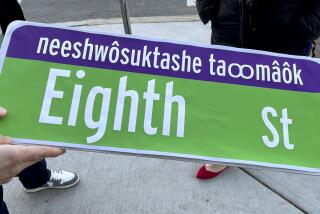NATO Gaining Ground in Kosovo
- Share via
PRISTINA, Yugoslavia — NATO-led peacekeepers pushed into the final northern third of Kosovo on Friday ahead of schedule, and their commanders said the last Yugoslav forces should be out of the ravaged province by the Sunday midnight deadline, as a new surge of refugees bused, drove or walked back into the emptied villages and towns that Serbs left behind.
At least 23,000 ethnic Albanians crossed back into their homeland Friday from neighboring Macedonia and Albania--the largest number to return in a day since NATO and Yugoslavia ended the war that drove about 1 million ethnic Albanians into refugee camps and guest homes in the region and abroad.
International relief officials Friday announced the first closure of a refugee camp: the Cap Anamur facility in the Albanian border town of Kukes. And an informal survey at camps in Macedonia by the Geneva-based International Organization for Migration on Friday found that 45% of the refugees wanted to leave as soon as possible, compared with just 10% a week ago.
In the past week, 60,000 ethnic Albanians have returned to Kosovo in response to positive reports from relatives who had returned to the province ahead of them.
But relief agencies, the U.N. and NATO commanders on the ground warned that the influx represents too many people, too soon.
Earlier Friday, a powerful bomb exploded outside the headquarters of the peacekeeping force in Skopje, the Macedonian capital. A senior Macedonian official called the blast “a clear terrorist attack” on the allied presence in his nation. The blast injured no one but showered the building with twisted shrapnel and woke about 300 allied soldiers sleeping inside.
The dangers are far greater and more varied here in neighboring Kosovo, a province of Yugoslavia’s main republic, Serbia.
Kosovo is littered with land mines, said peacekeeping officers. Six were found in a school in Pristina, the provincial capital. Houses that were occupied by Yugoslav forces after they fled barracks targeted by NATO’s air war are booby-trapped with wires, mines and explosives.
In parts of Pristina, now occupied by British troops, ethnic Albanians are finding their homes occupied by Serbian civilians, their possessions looted or their cars stolen. Under Yugoslavia’s agreement to withdraw all of its soldiers, police and paramilitary forces from Kosovo by midnight Sunday, they have few avenues for their complaints.
“They need to reinstate the police force as quickly as possible,” said Cpl. Danny Hinton, an Irish soldier with the 1st Battalion Irish Guard now stationed at the former Serbian police headquarters here. “We can’t go in with guns blazing everywhere.”
Lt. Gen. Mike Jackson, the British commander of KFOR, or Kosovo Force, as the international peacekeepers are known, said the United Nations plans to create a new police force and academy here and open recruitment to all ethnic groups in Kosovo. He added that a U.N. advance party “will arrive perhaps as soon as this weekend.” In the interim, the peacekeepers will be the chief law enforcement in many towns where Serbs have chosen to remain.
Convoys of Serbian civilians continued to lumber north with retreating Yugoslav forces, adding to a Serbian exodus that the International Committee of the Red Cross estimates at more than 50,000 civilians, while the peacekeepers tried to reassure Kosovo’s Serbian minority that their duty is to protect all ethnic groups.
As the new occupying force--which is nearly halfway to its goal of about 48,000 troops from Britain, France, Germany, Italy, the United States and other nations--continued to take new positions, KFOR spokesman Lt. Col. Robin Clifford said its commanders met Friday with local Serbian leaders “to urge restraint in what is still a very volatile situation. What we need is cool heads now.”
Meanwhile, the Serb-run media center reported that KLA rebels killed three Serbs in two Kosovo towns and kidnapped 18 Serbs in villages near Pristina. The report could not be confirmed.
Friday’s bombing outside KFOR headquarters in a former shoe factory in Skopje, a key staging ground for the force’s push north, reinforced the volatility of the region.
Representatives for the peacekeepers and the Macedonian government said there were no suspects in the blast that demolished a German army 5-ton truck in which investigators believe the bomb was hidden. German Capt. Siegfried Houben called it “a stupid act of a single person, and I don’t believe it’s an act of violence from a Macedonian directed toward NATO.”
But Stevo Pendarovski, spokesman for the Internal Ministry of the nation that was part of Yugoslavia less than a decade ago, had other theories.
“I think for certain the terrorist group or individuals wanted to send a bad signal about the political stability of Macedonia . . . that we may be next on the list for somebody to destabilize.”
Fineman reported from Skopje and Reitman from Pristina. Times staff writer Julie Tamaki in Skopje contributed to this report.
(BEGIN TEXT OF INFOBOX / INFOGRAPHIC)
Yugoslav Withdrawal From Kosovo
The withdrawal of Yugoslav forces from the Serbian province of Kosovo is proceeding according to the schedule agreed to by Western and Yugoslav authorities. It is slated to be completed by midnight Sunday.
The agreement delineates three zones of withdrawal by way of four gates leading from Kosovo to Serbia. Progress as of Friday:
Zone 1: Free of Yugoslav forces
Zone 2: Withdrawal nearly complete
Zone 3: Partial withdrawal
All Yugoslav aircraft and surface-to-air missiles have left Kosovo, in addition to:
30,000 troops (75% of total)
226 heavy artillery and mortar pieces (70% of total)
152 tanks (69% of total)
239 armored personnel carriers (80% of total)
Sources: Defense Department, NATO
More to Read
Sign up for Essential California
The most important California stories and recommendations in your inbox every morning.
You may occasionally receive promotional content from the Los Angeles Times.










